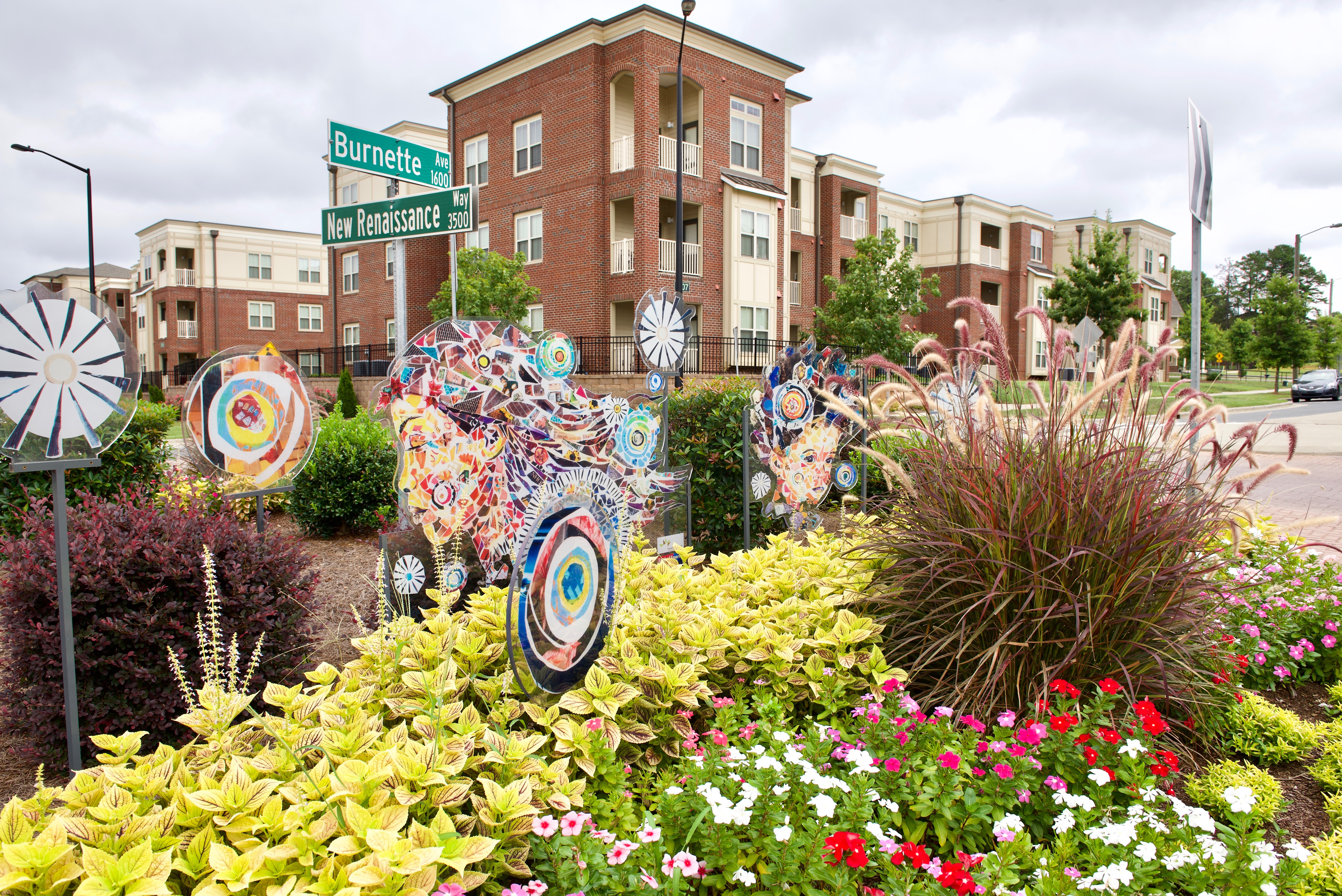Emerald green signs dot the street corners in The Renaissance, a redeveloped community in west Charlotte, marking Innovation Drive, New Renaissance Way, Achievement Lane, Ascension Way and Triumph Drive. The signs do more than direct travelers. They serve as symbols of hope in a community working to improve residents’ access to quality housing, education, health, wellness and – above all – opportunity, through a powerful cradle-to-career approach.
The Renaissance, with funding from the Charlotte Housing Authority and other supporters, focuses on factors that research shows can make an impact on people’s economic mobility.
Among them: new mixed-income housing replaced a public housing complex; Renaissance West STEAM Academy and the Howard Levine Child Development Center are central to the community’s revitalization; and access to career and wellness resources and other resources are making a difference in residents’ lives.
Important to this community effort is a core team of UNC Charlotte faculty members, graduate students and alumni affiliated with the Community Psychology Research Lab. Team members work closely on data collection and evaluation, in collaboration with the Renaissance West Community Initiative (RWCI).
The partnership with The Renaissance community is just one example of the collaborative nature of the UNC Charlotte lab. Every year for close to two decades, the lab has collaborated with up to a dozen Charlotte-area agencies and community organizations.
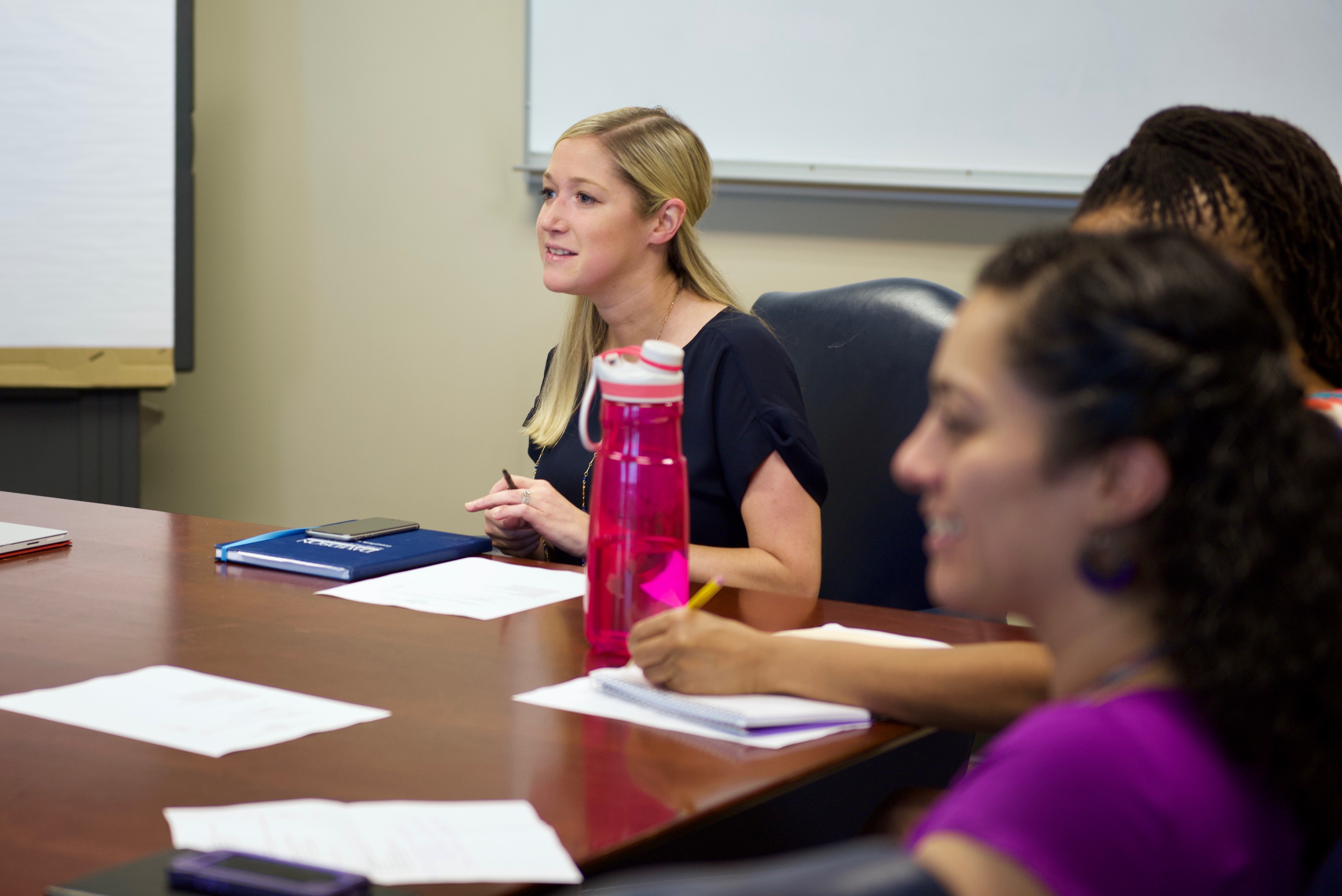
The Council for Children’s Rights collaborative group includes Virginia Covill ‘16, research and evaluation director with Communities In Schools (CIS) of Charlotte-Mecklenburg, who completed her Ph.D. in health psychology at UNC Charlotte.
“Our aim is to enhance the capacity of agencies, programs and systems to track meaningful data that informs their decision-making and guides what they can do with their resources,” said Ryan Kilmer, a professor in the Department of Psychological Science. “And, as a bottom line, we want our work to benefit the services and supports for kids and families.”
Leading the lab with Kilmer are department colleagues and community psychologists Jim Cook, Victoria Scott and Andrew Case. The lab is staffed by advanced graduate students who work with agencies at no cost, as part of their coursework. Some students are hired as graduate assistants for more long-term work, and some go on to take full-time evaluation and leadership roles within the organizations. Undergraduate students participate through a learning community and as research scholars.
With each community collaboration, team members focus on capacity building and sustainability. They concentrate particularly on the issues of early childhood education, mental health, public housing, child welfare and integrated primary and behavioral health care.
“We’re working at a systems level rather than an individual one—and with multiple organizations at a community level,” said Cook. “Understanding systems complexity is a huge part of this work and includes knowing how they operate and understanding dynamic settings, multiple actors and ambiguity. It takes patience and persistence to comprehend that impact takes time.”
Partnership Perspective
With the Council for Children’s Rights, lab team members have worked for years with multi-agency teams to address issues related to child custody, mental health, social services and juvenile justice.
“They have provided advice and guidance to us, as we have undertaken and developed a data and research policy practice within our agency that informs our individual advocacy and provides us with the basis to make systemic and institutional changes in the community,” said Bob Simmons, executive director of the Council for Children’s Rights. “This really has a big impact on the ability of children and their families to take advantage of opportunities in the community.”
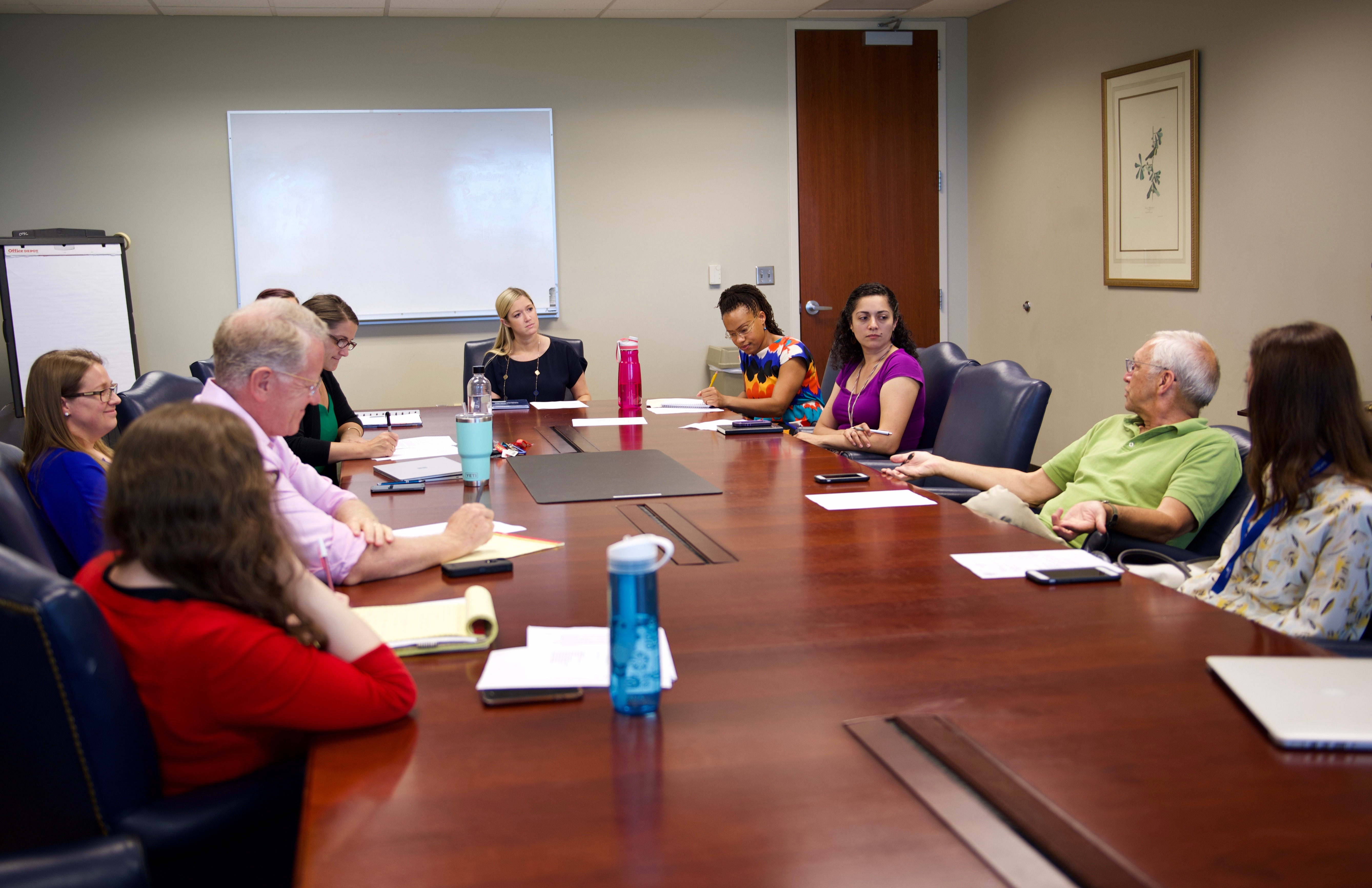
With the Council for Children’s Rights, team members have worked for years with multi-agency teams to address issues related to child custody, mental health, social services and juvenile justice.
Agencies know they need to gather and analyze data, but sometimes lack knowledge or resources to do so. Or they require a broader understanding of how to connect data to outcomes identified as important.
One long-standing partnership connected to economic mobility is the team’s work, led by Cook and Kilmer, with the publicly funded Pre-K program in Charlotte, particularly the Bright Beginnings program. The early childhood education programs serve 4-year-olds who have experienced disadvantage. In close partnership with Charlotte-Mecklenburg Schools, the team helped measure impact, clarify goals, develop measures and processes, and pilot observation tools, before issuing a public report on the program in 2013-14.
Since that time, the lab has obtained funding from the Institute of Education Sciences to assist the program’s ability to collect, manage and use data, and develop innovative strategies. Now, data is being used to enhance the coaching given to teachers to help them be more effective.
Respect Builds Trust
In addition to sharing information about collecting, analyzing and applying data to drive outcomes, lab team members bring immense knowledge of academic literature, a history of obtaining funding to support the work, and a record of national and state awards that recognize their impact. Yet, they do not see themselves as having all the answers.
“This is about relationships, partnerships and building trust,” Kilmer said. “I might know about applied research and evaluation, but our partners are the experts on their families and their kids. They know best about their organizational dynamics and the people they serve. We have to appreciate the strengths, capacity and expertise they bring to the table and communicate effectively about mutually beneficial objectives.”
Victoria Scott continued, “It’s important to take time to understand the context of the organization. We understand the importance of readiness for particular steps. Our program does well in training students to listen intentionally, and to identify these markers, and being able to converse with organizations in a way that matches their readiness.”
In its work with The Renaissance in West Charlotte, the UNC Charlotte team collaborates with Building Uplifted Families project manager Monica Thomas. “The data and evaluation team from UNC Charlotte is essential to making sure we stay on track, because we are interested in sustainability,” Thomas said.
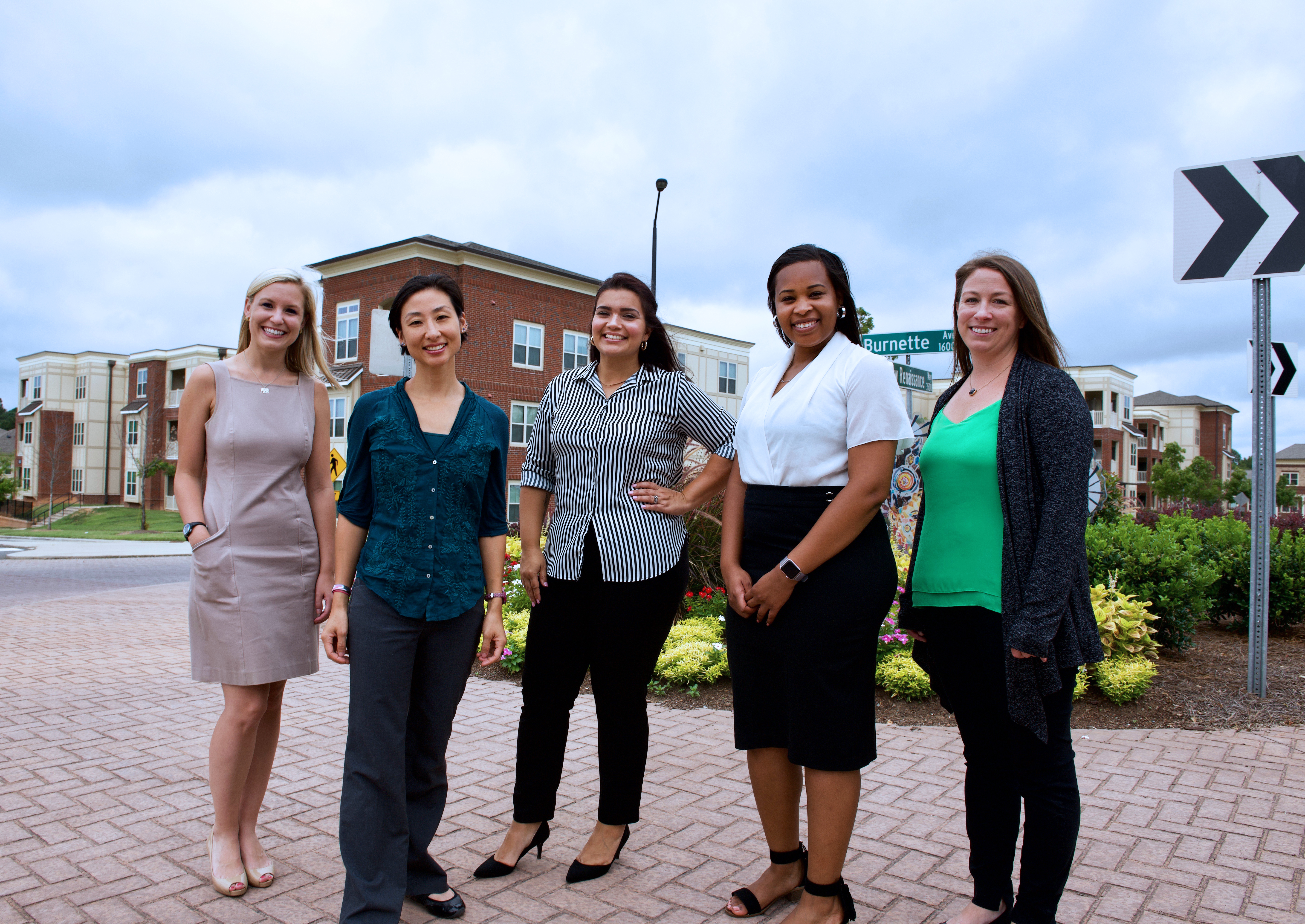
Some of the team members in The Renaissance community effort: UNC Charlotte health psychology doctoral student Margaret Gigler, Psychology Professor Victoria Scott, RWCI project manager Monica Thomas, RWCI Community Engagement Officer Jamese Pinkston – who earned her master’s degree in geography with a concentration in community planning from UNC Charlotte, and RWCI Senior Associate Program Officer Jackie Tynan – who earned her master’s degree in community psychology and doctoral degree in health psychology from UNC Charlotte.
Thomas leads a team of professionals known as life navigators, who work with The Renaissance community residents as they access information, education, and life planning services, and as they advocate for themselves. Funded by a national grant from The BUILD Health Challenge and by two local health care systems, Building Uplifted Families includes Novant Health, Atrium Health and Mecklenburg County Public Health.
Scott leads the data and evaluation efforts along with Michael Dulin, director for the Academy of Population Health Innovation in UNC Charlotte’s College of Health and Human Services.
“The ultimate aim of the initiative is to improve social mobility and the access to opportunity in The Renaissance community,” Scott said. “Two healthcare systems that have traditionally been competitors locally are working hand-in-hand, along with a host of other organizations, to link Renaissance residents to resources.”
In concrete terms, the UNC Charlotte collaborators worked with RWCI staff to create a customized data management system, which allows life navigators to input and also dig into data to better understand the needs of residents of The Renaissance. They are also using the data to provide detailed updates to funders and other stakeholders.
“Our relationship with the lab team members allows life navigators to have complete autonomy in what they’re doing; they are they to support and guide us,” said Thomas. “They make recommendations, but we don’t feel as though it’s an academic study. Life navigators are experts, and the UNC Charlotte team helps us interpret the work. We don’t immediately see the beauty of it until the evaluation team shows us an automated picture of what the data are saying.”
Jackie Tynan ’16, who has joined RWCI as senior associate program officer, is an important collaborator. She earned a psychology master’s degree from UNC Charlotte and is now pursuing a doctoral degree in the community psychology training program within the health psychology doctoral program at UNC Charlotte.
“Nonprofit work is fast paced and leaves little time for a small organization like RWCI to focus on evaluation and outcomes,” she said. “Both of these, however are critical to the success of any community organization. This partnership with UNC Charlotte allows us to do our work without missing out on measurements and reporting our outcomes.”
Growing Skills
In another partnership, UNC Charlotte’s Andrew Case works closely with The Males Place, a nonprofit whose mission is to provide comprehensive and prevention-based behavior health educational programming, mentoring and life skills training necessary for manhood development for African American boys ages 12 to 18.
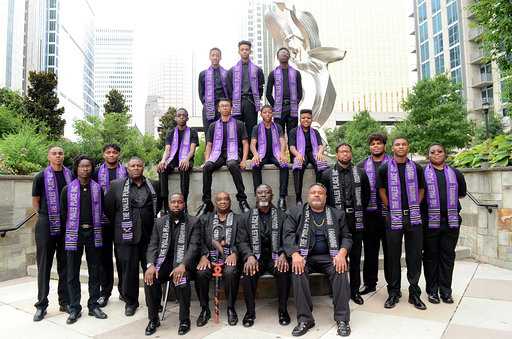
One partnership effort works closely with The Males Place, a nonprofit whose mission is to provide comprehensive and prevention-based behavior health educational programming, mentoring and life skills training for African American boys.
“I bring a deep passion for working with marginalized communities, specifically people of color and communities of color, to create pathways to resources and better outcomes,” Case said.
Since 2009, The Males Place has operated a community garden that provides a variety of crops to the local community. “Adolescent members of the community tend the garden as an opportunity to give back and as a means of gaining competency and a sense of confidence and self-worth as they develop into men,” he continued.
Case has worked with Reggie Singleton, founder and executive director of The Males Place, to develop what is known as a logic model, a tool used widely to evaluate the effectiveness of a program. It presents a picture of how a program works, including its main components and how they relate to one another, and how they are related to outcomes.
Libby Safrit ’97, a leader at another agency partner, views the Community Psychology Research Lab from both a student and partner perspective. She earned a master’s degree in clinical/community psychology from UNC Charlotte and now is the executive director of Teen Health Connection.
“You can do phenomenal work. But if you don’t have the evaluation component—if you don’t have a way to systemically measure the real impact of those dollars—no matter how great your work is, you will not be able to sustain your funding, nor will you be able to sustain your work,” she said. “That is what the partnership gives you.”
Similarly, Virginia Covill ’16, research and evaluation director with Communities In Schools (CIS) of Charlotte-Mecklenburg, sees the work from both vantage points. She completed a Ph.D. in community health psychology while working with community partners as a graduate student.
“Equally important to those we serve are the skills each party brings to the table,” she said. “For participating nonprofits and agencies, it’s their high level of expertise. For UNC Charlotte, it’s knowledge of data and its application. Knowing we can trust implicitly that our University partner holds social justice in high regard and shares the same respect for the challenges faced by individuals in our community makes the collaboration productive.”
Current and past partners, several with students and alumni holding leadership positions, include Charlotte Bilingual School, Charlotte-Mecklenburg Schools Pre-K: Bright Beginnings, A Child’s Place, Circle de Luz, City of Charlotte, Communities in Schools: Charlotte-Mecklenburg, Community Culinary School of Charlotte, Council for Children’s Rights, The Males Place, McColl Center for Art + Innovation, MeckCARES, Mecklenburg County Department of Social Services, ParentVOICE, Renaissance West Community Initiative, Teen Health Connection, Thompson Child and Family Focus, and United Way of Central Carolinas.
Words and Images: Lynn Roberson, CLAS Communications Director



